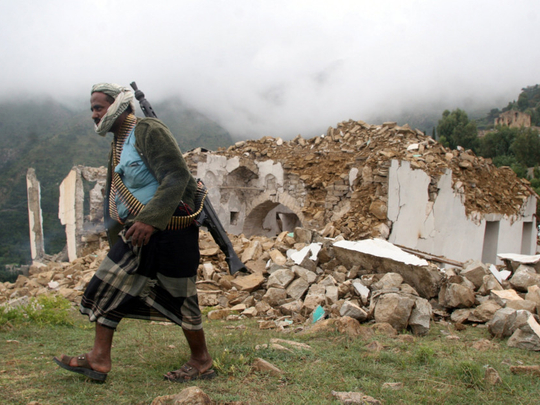
Al Mukalla: The UN envoy to Yemen Esmail Ould Shaikh Ahmad said on Saturday that faltering peace talks in Kuwait would be extended for a “short period of time” to discuss a new formula for peace to be presented to the warring sides.
“I delivered to the two delegations a paper detailing a vision for the next phase in order to reach a political solution,” Ould Shaikh Ahmad wrote on Twitter shortly after a meeting with the government delegation.
On Saturday, a member of the government team told Gulf News that they have come under pressure from western diplomats to change their minds about leaving Kuwait and pulling out of peace talks.
“They urged us to stay put and come out with some sort of preliminary agreement,” the delegate said on the condition of annonymity since he was not authorised to brief reporters on private discussions.
On Thursday, Iran-backed Al Houthi militants threw a wrench into peace talks when they proposed a supreme political council of 10 members to run the country, with ousted Yemeni president Ali Abdullah Saleh included in the council.
The internationally recognised government of Abd Rabbo Mansour Hadi want Al Houthis to withdraw from territories they have occupied, hand over weapons and allow the government to return to Sana’a.
Al Houthi’s took over the capital in 2014 forcing Hadi under house arrest. Hadi managed to escape and shifted the Yemeni government headquarters to the southern city of Aden.
Since then, a Saudi-led Arab coalition has been fighting to reverse Al Houthi territorial gains in the country.
Initially Al Houthis agreed to the government demands, but as they continue their ground war with the support of weapons shipped from Iran, they have become emboldened during the Kuwait talks.
The Yemeni government delegation has long complained that Al Houthis are stalling the peace talks in order to gain more territory as peace talks inch forward.
Meanwhile on the ground, Al Houthis attacked government forces controlled territories in Taiz, Jawf, Shabwa and Lahj but have failed to make much headway.
In the besieged city of Taiz, local tribal leaders and activists said on Saturday that Al Houthis and army units loyal to the ousted president Ali Abdullah Saleh were mobilising forces outside the city apparently preparing for an assault for the recapture of areas from pro-government forces.
Activists said three civilians were killed and five injured on Friday when a landmine planted by Al Houthis exploded in Najed Gassem in the southern side of the city. Five Al Houthi fighters were killed in fierce battles with the government forces in the city on Friday, according to residents.
The rebels also continue to intensify their blockade on the densely-populated city for the second week in a row, preventing people from entering or leaving and blocking vital humanitarian aid.
In the northern province of Jawf, local tribal leaders said on Saturday that a tribesman defected from Al Houthi ranks and vowed to fight alongside government forces. Maen Media Centre said that Mohsen Hussain Bin Shamla abandoned Al Houthi militants and returned to his house in the government-controlled Al Masolub district.
Last week, similar media reports said that at three leading local figures who fought with Al Houthis had shifted their loyalty to the government.












